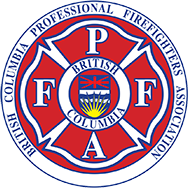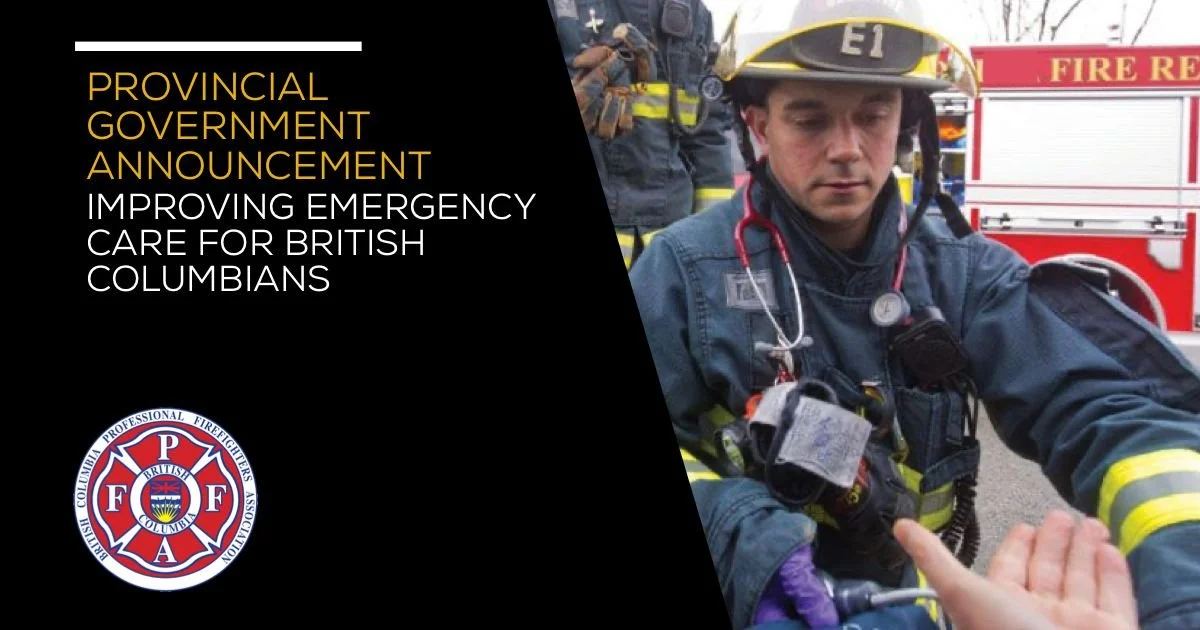BC Government Enhancing emergency care for British Columbians
On December 3, 2021 the BC Ministry of Health Adrian Dix announced that the province is expanding the care fire fighters and paramedics can provide to British Columbians in emergency situations.
View BC Government News Release
Through several steps and an independent review, we are pleased to see forty three recommendations in total that are being put forward. Overall, these changes will help support the health-care system and critically needed prehospital care for people, allowing for better patient care, experience and outcomes.
The BC Government stated that the changes are further supported by increases to patient care that fire based EMS can provide including:
additional diagnostic testing such as blood pressure and blood glucose that can better inform fire fighters and paramedics about the next steps in care for a patient
administering epinephrine when needed for a life-threatening allergic reaction
supporting the preparation or packaging of patients for transport by paramedics
Fire fighters responding to incidents where they are waiting significant periods of time for ambulance paramedics will now be able to gather diagnostic information that assists the patient, and with medical oversight, be able to offer immediate treatment and interventions. Putting the patient first must always be the priority and these scope of practice changes will allow fire fighters the ability to offer an increased level of patient care.
We were pleased to hear Chair of the EMALB Ryan Sinden state in the press conference,
“It represents the most significant change over the last 30 years. As a paramedic I'm excited to deliver more comprehensive assessments and life-saving treatments to my patients. As a Fire fighter I appreciate the increase in diagnostics to better inform incoming paramedics of patient status as well as provide new time-sensitive treatments to patients in need. As an educator, I welcome the opportunity to design more fulsome training that will incorporate the new diagnostics skills and therapies to improve clinical care.
Finally as a British Columbian, I'm reassured that when somebody calls for help, responders will show up with more tools and training than they have ever had before, prehospital transport medicine has long been recognized as an important healthcare specialty that impacts everyone. My colleagues and I are really excited to see the frontier of emergency Health Services in British Columbia.”
It is critical fire fighters increase our skills to meet the demands of the public who in their time of need are putting their trust in the 9-1-1 system and the layered response pre-hospital care model, and these changes will assist in bringing a higher level of care to the patient
In July 2021, the province experienced a ‘heat dome’ weather event that negatively impacted our emergency medical system with service volume that could not be met, and sadly over 700 citizens succumbed to heat-related causes of death. And recently with the impact of the devastating floods, with communities cut off from outside help, the ability to offer am improved level of care for those in need clearly demonstrates the need for these changes.
In August 2021, the BCPFFA executive board and EMS committee presented twenty six comprehensive recommendations to the Emergency Medical Assistants Licensing Board (EMALB), in addition to all stakeholders including the Office of the Provincial Health Officer, Provincial Health Services Authority, BCEHS, Fire Chiefs Association of BC (FCABC), Office of the Fire Commissioner, urban and rural fire chiefs, urban and rural representatives from the Local Government Management Association (LGMA), First Nations Emergency Support Services (FNESS), First Nations Health Authority and Patient Voices Network) that collectively believe will enhance the way fire based EMS can serve the public.
These recommendations not only address the First Responder (FR) level but that of the Emergency Medical Responder (EMR) level, and were offered in a manner that addresses both the rural and metro settings that the pre-hospital care system serves.
On behalf of the BCPFFA we thank the BC Government for making these highly anticipated changes in pre-hospital care and for seeing the value in enhancing the scope of practice for all fire fighters and paramedics. These changes will make a difference in the delivery of care for citizens across the province.
Regards,
Gord Ditchburn
President


